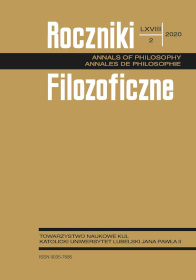The Cartesianism and Anti-Cartesianism of Locke’s Concept of Personal Identity
The Cartesianism and Anti-Cartesianism of Locke’s Concept of Personal Identity
Author(s): Adam GrzelińskiSubject(s): Philosophy, History of Philosophy, Epistemology, Renaissance Philosophy, Early Modern Philosophy
Published by: Towarzystwo Naukowe KUL & Katolicki Uniwersytet Lubelski Jana Pawła II
Keywords: René Descartes; John Locke; personal identity; rationalism; empiricism
Summary/Abstract: This article focuses on the relationship between the conceptions of personal identity presented by Descartes and by Locke. Contrary to common readings, I claim that the difference between them cannot be reduced to a simple contrast between rational substantialism and genetic empiricism. Locke does not resign from the substantialist position but delimits the two spheres: natural cognition with its foundation in experience and philosophical speculations, in which he tries to present a rational interpretation of religious dogmas which is consistent with his epistemological programme. Locke’s criticism is directed against the Cartesian notion of a thinking thing as a substance independent of the body and his description of the differentiation of experience and his depiction of human subjectivity is expanded in relation to Cartesian philosophy: personal identity gains explication at four complementary levels: psychological, biological, socio-legal, and religious.
Journal: Roczniki Filozoficzne
- Issue Year: 68/2020
- Issue No: 2
- Page Range: 195-212
- Page Count: 18
- Language: English

